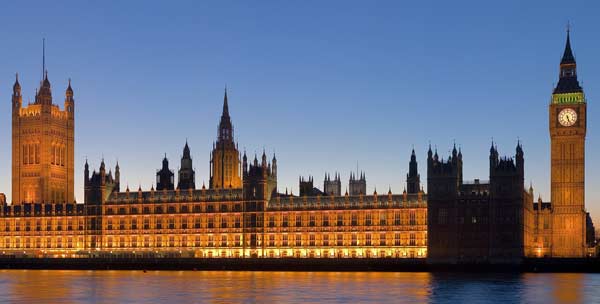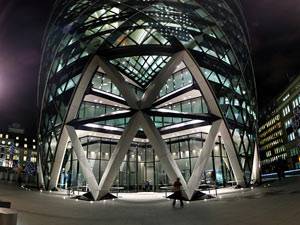A settlement for nearly 2,000 years, London is today the most populous greater metropolitan area in Europe with over 13 million residents. Home to popular tourist locations such as Big Ben, The London Eye and Buckingham Palace, London’s skyline is unmistakable. While London often serves as the representative bridge from Europe to the United States, it also is the seat of Europe’s rapidly expanding entrepreneurial landscape.

The London startup scene saw its first major consumer Internet success in 1998 with LastMinute, a travel site similar to Expdedia that eventually traded publicly on the London Stock Exchange beginning in 2000. UK companies like LastMinute were largely able to avoid the doom and gloom of the dot-com bubble burst at the turn of the century due to the nature of the venture funding scene.
RWW’s Never Mind the Valley series:
The key difference between the startup communities in London and Silicon Valley is that the latter has VCs more willing to take risks with their investments and give money to early-stage companies. The opposite is true in London, meaning that during the dot-com era, there were fewer startups and fewer risky investments.
The more daring VCs of Silicon Valley choose to ride the roller-coaster of risk vs. reward and often find success that way, while London VCs choose to take safer bets, investing money in established companies with traction. The major UK firms, such as Index Ventures, Accel Partners and Balderton Capital used this to avoid the pitfalls of events like the dot-com bust, but they sacrifice the possibility of higher returns because of it.

It is this attitude that has created a difficult venture funding scenario for early-stage startups looking for seed money in London. Azeem Azhar, founder of Viewsflow, a platform for identifying valuable business information online, says that three obstacles stand between startups and success in London.
The first problem is the difficulties in securing capital due to apprehensive VCs and a lack of second- and third-generation entrepreneurs. The second problem Azhar notes is one of talent.
“Silicon Valley’s talent depth is astonishing, and when you get smart people in the same room they make better ideas,” Azhar told ReadWriteWeb. “The numbers are comparatively smaller in London, and there are better industries for engineers to go into, like banking.”
The third problem Azhar sees is that the markets in Europe are significantly smaller than US markets. According to Azhar, a typical European early-stage company will sell for less than $50 million, while VCs are looking to make $100 million or more. This complements the first problem, allowing already cautious VCs to become more fastidious than before.
However, things have begun to turn around for the London startup scene. In the past, entrepreneurs would leave the UK and cross the pond to the US to find the money to get off the ground. More recently, however, organizations like Seedcamp and The Accelerator Group, as well as new funds like Atomico Ventures and PROfounders Capital, have begun to provide young startups with funding and resources.

Mark Littlewood of The Business Leaders Network, a UK-based membership organization that helps connect CEOs and founders with investors and possible customers, says that the VC firms in London are letting their influence slip away.
“The most significant trend recently has been the decline in influence (in start up terms at least) of the venture community,” Littlewood told ReadWriteWeb. “VC firms have either been struggling to raise funds whilst at the same time have focused on investing later in more mature businesses.”
What is driving this new force of organizations and funds for early-stage startups? It’s the second generation of entrepreneurs from previous successful London startups. The most successful project to come out of London (and perhaps all of Europe) is Skype, which was founded in 2003 by Niklas Zennstrom and Janus Friis and later acquired by eBay for nearly $2 billion in cash.
Zennstrom is now the co-founder of Atomico Ventures. The fund is an effort to invigorate the venture capital industry in the London area so that it may be more like the US – a dichotomy Zennstrom knows well.

“I think we went to over 20 VCs here in Europe, and no one wanted to touch the company,” Zennstrom recalled about Skype during a keynote at LeWeb in 2009. “Always the Silicon Valley option seemed very very attractive because it’s such a powerful ecosystem with VCs that are brave that are willing to take risks.”
But Zennstrom, along with countless other entrepreneurs, stayed in Europe and managed to create a successful company. Major successes to emerge from London include Last.fm, an Internet radio service acquired by CBS in 2007, Bebo, the largest social network in the UK, which was acquired by AOL in 2008, and Playfish, a social gaming platform acquired by EA in 2009. Other London startups include MOO, TweetDeck, Playfire, LOVEFiLM, HuddleWAYN and Seatwave.
With the cycle of returning second-generation entrepreneurs like Zennstrom, the startup scene in London is beginning to grow and be more inclusive. Saul Klein, a partner at Index Ventures and a former Skype employee, has played a large role in mobilizing the startup community by founding both Seedcamp and the Open Coffee Club.

Stephanie Robesky, an entrepreneur in residence with Atomico Ventures, says that thanks to the new funds and organizations in London, things are looking up for the future.
“There are great opportunities for people to start businesses in London with not just financial support, but operational support as well,” Robesky told ReadWriteWeb. “I think that it is going to continue developing and maturing. The Valley has years on London and Europe, but the Europeans are ambitious.”
Other London-based startup events and organizations include DrinkTank London, NESTA, Springboard and Glasshouse London.
Photo credits: Trodel and Ian Muttoo.
Special thanks to Azeem Azhar, Mark Littlewood and Stephanie Robesky for information and a crash course in London.

















